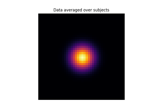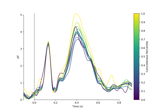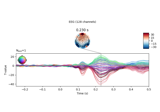mne.stats.linear_regression¶
-
mne.stats.linear_regression(inst, design_matrix, names=None)[source]¶ Fit Ordinary Least Squares regression (OLS).
- Parameters
- instinstance of
Epochs| iterable ofSourceEstimate The data to be regressed. Contains all the trials, sensors, and time points for the regression. For Source Estimates, accepts either a list or a generator object.
- design_matrix
ndarray, shape (n_observations, n_regressors) The regressors to be used. Must be a 2d array with as many rows as the first dimension of the data. The first column of this matrix will typically consist of ones (intercept column).
- namesarray_like |
None Optional parameter to name the regressors. If provided, the length must correspond to the number of columns present in regressors (including the intercept, if present). Otherwise the default names are x0, x1, x2…xn for n regressors.
- instinstance of
- Returns
- results
dictofcollections.namedtuple() For each regressor (key) a namedtuple is provided with the following attributes:
beta : regression coefficients stderr : standard error of regression coefficients t_val : t statistics (beta / stderr) p_val : two-sided p-value of t statistic under the t distribution mlog10_p_val : -log10 transformed p-value.
The tuple members are numpy arrays. The shape of each numpy array is the shape of the data minus the first dimension; e.g., if the shape of the original data was (n_observations, n_channels, n_timepoints), then the shape of each of the arrays will be (n_channels, n_timepoints).
- results


